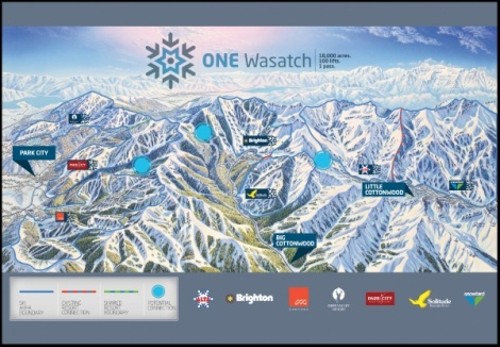Thursday, March 20, 2014
One Wasatch Plan Aims To Connect 7 Ski Resorts
Posted By Colby Frazier on March 20, 2014, 11:34 AM
After decades of toying with the idea of linking all seven of the central Wasatch Mountain ski resorts, the vision took a leap toward reality Wednesday when resort managers and Ski Utah unveiled an effort to make it happen.
Dubbed One Wasatch, the plan would involve slicing lifts across swathes of mountaintop to link Little Cottonwood Canyon to Big Cottonwood Canyon, the Cottonwood Canyons to Park City Mountain Resort and PCMR to the Canyons Resort.---
One Wasatch was met with rousing enthusiasm from resort officials at a private press event, but it likely will face an uphill battle. A similar effort called Ski Link, which would have linked the Canyons Resort to Solitude Mountain Resort, crashed and burned when Congress failed to act on selling away National Forest land to the resorts.
And any expansion to the footprints of these ski resorts occurs in the heart of protected watershed, which supplies 60 percent of the Salt Lake Valley's yearly water supply.
But Nathan Rafferty, president and CEO of Ski Utah, says the watershed won't be hurt, the lifts can be built on private property and One Wasatch will help keep Utah ski resorts competitive with Colorado and California.
“We don't have all the answers today, it's a concept,” said Rafferty, noting that when he's asked why he wants to connect the resorts, his answer is “Why not?” “Everything about the concept starts and ends with creating the best possible ski experience for our guests,” he said.
By connecting the resorts, which include Brighton, Solitude, Snowbird, Alta, Canyons, Deer Valley and Park City, Rafferty said a European-like experience can be created in Utah, where one can begin the day skiing at Snowbird, lunch at Deer Valley and finish it off someplace else.
Rafferty said the connections could be made with a handful of ski lifts, which would allow ambitious skiers to access 18,000 acres of terrain on one pass, the cost of which has not been determined.
In announcing their support for the plan, many resort managers noted the unique atmosphere at each of their resorts—a small-time feel abandoned long ago in other ski states that are notorious for traffic jams and infinitely long lift lines.
To be clear, Rafferty said he doesn't believe Utah should become more like Colorado or California, but he does want to see Utah gobble up a larger share of the ski market, 7 percent of which exists in the Beehive State compared to Colorado's 20 percent.
“We have a great experience here in Utah and I think we just want to build on that experience,” he said. “If we have something like this we would be miles apart. I think it would separate us even more from Colorado and California.”
The One Wasatch plan, though, drew a sharp rebuke from the group Save Our Canyons, which advocates for the preservation of the Wasatch Front's canyons.
Illustrating the touchy nature of the One Wasatch idea, even in this early stage (Rafferty said there is no time line for construction or permitting and no firm cost estimate) was the initial refusal by Ski Utah to allow members of Save Our Canyons into the news conference.
Carl Fisher, executive director of Save Our Canyons, said when he told Ski Utah officials who he was, they asked him to stand outside. He said he told them: “Yeah, OK. I guess if you don't want to let us know what's going on in the central Wasatch on our public lands, that's fine.”
Eventually, Fisher was allowed to attend the news conference on the condition that he not speak.
Fisher said the One Wasatch plan is little more than an attempt at de facto resort expansion. He noted that the big money in the ski industry is in real estate, not lift tickets. And with each lift expansion at resorts throughout the Wasatch, multi-million dollar homes have followed, filling in the blank spaces.
“That's the model with the ski industry in the United States,” Fisher said. “And that's what's really concerning to us.”
Fisher said he wasn't surprised Ski Utah didn't want him in on the meeting. Given the controversy surrounding Ski Link, One Utah—an even more ambitious plan—is going to be controversial.
“I think they know it's not a very popular idea,” Fisher said.
Mike Goar, of the Canyons, which is owned by ski industry giant Vail Resorts, said if One Wasatch goes through, his bosses will drop their efforts to wrest National Forest land for Ski Link.
“We view this as a viable alternative,” Goar said, noting that Ski Link has “certainly been put aside."
An unsettled question that might impact the One Wasatch effort is the festering court case between Vail and Park City Mountain Resort. Centering on a lease dispute, Vail has attempted to evict PCMR.
But for now, when it comes to One Wasatch, all of the resorts are on board and singing praises.
“I still think we have a unique opportunity there to connect the resorts,” said Bob Bonar, president of Snowbird. He added that he feels each resort can “maintain its own identity, which has been great of all of us for a long time and also protect a lot of the values that are important to us.”
“And I don't think we'll overrun the resorts like they are in Colorado. …” Bonar said. “We don't want to become those resorts.”
More by Colby Frazier
-
Fire Line
UFA Board considers recouping bonuses paid to former chiefs and turning investigation over to law enforcement.
- Jan 25, 2017
-
Home Sweet Home?
How a single real estate deal highlights a city in flux and in crisis.
- Jan 4, 2017
-
Dead Red
That Utah could end up voting something other than Republican proved delusional.
- Nov 9, 2016
- More »





